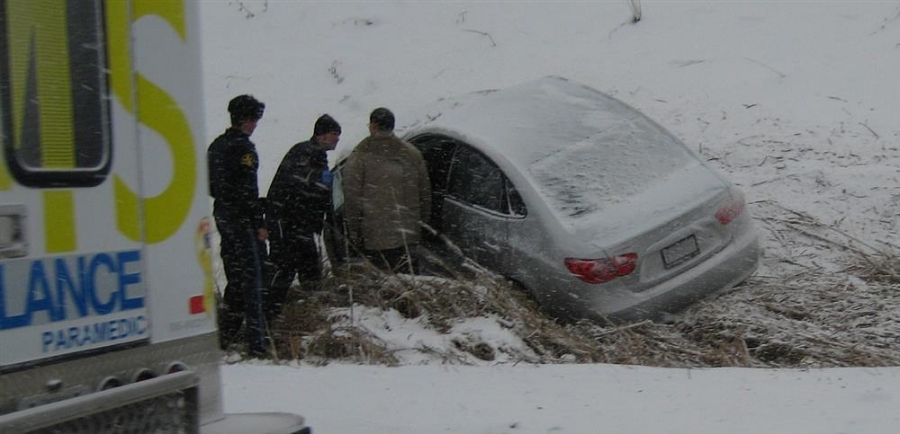
Oh, the thrills of winter driving! At this time of year, there's plenty of fresh snow and ice on the roads, bad weather, poor visibility due to fog and ice and sleet, and around the holidays, a significant increase in the number of vehicles on the road - many of whom, sadly, are operated by impaired drivers. All of these factors mean your chances of being involved in an accident will increase dramatically. Would you know what to do if that happens?
1. Do not leave the scene of the accident.
If the accident was your fault, leaving the scene is grounds for a hit-and-run charge, which is a crime and carries a severe penalty. Even if it wasn't your fault, leaving the scene is not a good idea. If you were a witness, your witness statement will be required for the authorities to get a clear picture of what took place. And finally, there's a good possibility you may have been injured even if you're not aware of it. You could be in shock - it's best to wait until police or paramedics have had a chance to check things over.
2. If there are injuries, call an ambulance immediately.
If it is safe to leave victims where they are, do not move anyone who may be injured. Wait for the paramedics to arrive. Moving an injured person may result in aggravated injury or even death. If you have first aid training, do what you can to stop any bleeding and keep the person warm.
3. Call the police if necessary.
If the accident is a serious one, call the police immediately. Do not move the vehicles until a complete record of the accident circumstances has been made. If possible, turn your hazard lights on. If you have flares or some other warning signals, use them to help reroute other traffic around the scene. Stay out of the way of other traffic trying to get around the vehicles involved.
4. Exchange all vital information for insurance purposes.
Exchange names, addresses, phone numbers, insurance, driver’s license and vehicle registration numbers with the other driver(s) involved.
5. Get as many witness statements as you can at the scene.
If a potential witness needs to leave the scene, get their names, addresses and phone numbers so that you or the police or the insurers can contact them for their statement.
6. Record as much information as possible at the scene.
Get all the details you can at the time, including road and weather conditions, estimated speed of the vehicles, positions of the vehicles before and after impact, etc. Take photos of the damage at the scene if possible, and if not, then as soon as possible following the incident.
7. Cooperate with the police fully.
Cooperate with the attending officers, answer their questions and do what they tell you to do. If the accident is a minor one and the police do not come to the scene, you should file an accident report with them as soon as possible to help protect your rights.
8. Report the accident to your insurers right away.
Your insurance company will need to know the details as soon as possible. Do not sign any releases, waivers or any type of settlement offer from any insurance company until you have reviewed the situation with a lawyer.
9. See a doctor as soon as possible.
Some injuries may not manifest any symptoms until hours or even days after an accident. Even if you are not in any pain and do not have any visible outward signs of being injured, you should be examined by a doctor as soon as possible to ensure that you did not sustain any injury, especially to the neck, spine or cranial area.
Image licensed by Wikimedia.org

